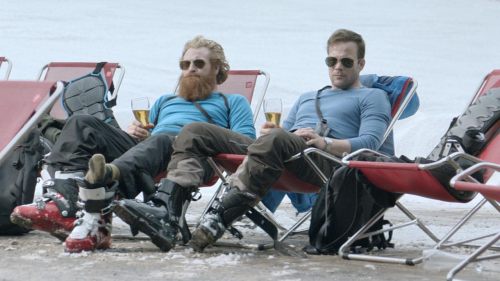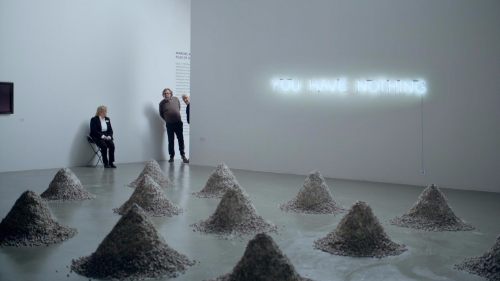Controlled Avalanches: FORCE MAJEURE And The Horror Of The Family Unit
The Square is out in theaters. Get your tickets here!
You’d die for the people you love, right? Of course you would. We all would. It’s that grand ideal, the noblest of sacrifices. So many of our narratives, as people, as nations, as civilisations (particularly hyper-masculine ones, but also those of romantic couples) are built around this ideal - turning away from animalistic survival instinct in that moment of truth, and allowing yourself to face the cruel hand of fate in another’s stead. It is a nice way to shuffle off this mortal coil. It is also deeply weird and emblematic of our morality-obsessed culture, in which the great void is currency for one’s ultimate show of character. Most of us are taught that when the time comes those we love will override those fight or flight instincts nature embedded within us. Which is to say that for most of us the fantasy is probably bullshit.
Ruben Östlund’s Force Majeure is the kind of film that pays dividends off the back of going in cold. Truthfully, the less you know about the film before watching, the better. Ostensibly caught somewhere between a supremely dark comedy and an austere European drama, the truth is that Östlund’s film is, for all intents and purposes, a horror. The story of a picturesque upper-class family on a ski trip whose trust in each other falls to pieces after a sudden moment of clarity – an out of control avalanche, striking the restaurant where they are dining, causing the husband Thomas (Johannes Bah Kuhnke) to grab his gloves and his phone and run for his life as his wife Ebba (Lisa Loven Kongsli) shields their two young children. Over the course of two hours, Force Majeure quietly, methodically and gleefully draws you into its snare with the patience of a predatory cat. Everything in the film is geared toward a sort of ambivalent nastiness, an almost childish wickedness in tearing apart the comfortable falsehoods of the bourgeoisie, of the traditional family unit, and the ideals of the patriarchy. Östlund is uniquely, supernaturally attuned to the microaggressions and the ever-present tension in the dominance of these ideals, finding in a family dramedy about a ski-trip gone wrong a clinging, dread-soaked horror aesthetic dripping coolly off the edges of sterile frames or striking suddenly in the accusatory glances between couples.
Östlund wears his Kubrick influence on his sleeve in Force Majeure, most notably the chilly framing and lingering, desolate unease of the winter locations of The Shining. Like that film, Force Majeure’s greatest evil lies in the heart of a family man. It is a social horror, but also a familial one. Ostlund takes great care in laying bare the toxic hold Thomas has on his family – one he may not even be aware he has - in his constant gaslighting, white lies and casual undermining of his wife and children. When the avalanche - an external ‘Act of God’ moment - lays his weaknesses bare, the monster is revealed. The act of betrayal is the ‘monster’ of the film, and like any good horror film, it becomes a question of not if, but when it will strike and kill the comfortably placid vanilla family unit at the centre.
Östlund, like a number of great European auteurs, employs horror subtly but cleverly in his films to drive home the wider thematic point. As in the existential terror at the heart of so much of Bela Tarr’s work, or the sadistic domestic nightmares of Michael Haneke, Östlund clearly delights in retooling what scares us in fascinatingly artful ways. Östlund is as ruthless as Haneke in his aim to make the viewer uncomfortable, and takes no end of delight in drawing out lengthy, painfully tense shows of Thomas and Ebba ‘keeping up appearances’ with the other couples in the film (including Game of Thrones’ favourite Wildling, Kristofer Hivju, playing hilariously against type here). There are subtly biting moments of spine-tingling dread throughout – little gracenotes to set the entire structure of the film just slightly off-kilter.
Indeed, the whole film is threaded through with the visual and sonic language of horror cinema. Aside from the snowbound Shining nods, the film draws intelligently from its setting to create a soundscape of unnerving drones and shrieks, replicating in the whir of an electric toothbrush or the scream of metal ski lifts or hum of vacuum cleaners the eerie violin squeals of a slasher film score. The boom of the cannons that control the avalanches outside Thomas and Ebba’s hotel room replicate the ominous thunder of a haunted house in a storm. Then there is the stately, handsome architecture of the framing of the film - from the foreboding, drifting tracking shots laden with portent to the clinical distance with which Ostlund keeps the camera from his subjects - with a few (very) notable exceptions. Watching the film, we feel as if we were watching from just out of sight of the characters themselves. This allows for the world outside of Thomas and Ebba to intrude every now and then with perfect, malicious timing. Observe this, arguably the best scene in the film:
Everything in the film has been gearing us toward this confrontation and now, in the moment, it is almost unbearable to watch. That stomach-churning feeling we have watching the scene is one most closely associated with horror – something Ostlund is purposely, slowly boiling us in, before that shocking, utterly hilarious release in the strike of the drone. The rush of this moment, like that of a jump-scare in horror, is cathartic – a chance to revel in the consequences the characters on screen must endure for having awoken their monster.
Like his new film The Square, Force Majeure targets the cozy lies of the male bourgeoisie, stripping away layers to reveal the rotting souls of those within both to us and themselves, and drawing out the thread past a place of comfort to observe the way these humans deal with that revelation. Thomas’ prideful positioning as the authoritative patriarch is utterly dismantled in the process, culminating in a sublime comedic sequence in which he, utterly adrift, finds himself in a nightclub on the side of the mountain surrounded by sweaty, shirtless, screaming men – caught in an existential howl for their oh-so-fragile masculinity, as the music around them fades away, but the screaming continues.
Finally, Force Majeure almost convinces us that it will wrap everything up cleanly in a gangbusters visual climax, as Ebba gets lost in a fog on the side of the mountain, requiring Thomas to literally fireman-carry her to safety in an image symbolic of the traditional family man returning to the fold. However, we are then treated to one of the more enigmatic and unsettling sequences in modern cinema, as all the major characters clamber onto a bus to leave the mountain, only to find themselves once again caught in a moral and potentially lethal quagmire that calls into question the entirety of the events that came before. In Östlund’s film, no one is truly able to escape the monster – those animal survival instincts, the ultimate betrayal – and the moral high ground is never entirely stable. It is a breakneck reversal that doesn’t work for some, but reveals to me Östlund’s hand as a horror filmmaker. You can never truly kill the monster in horror, there’s always going to be a sequel. Force Majeure leaves us as the characters wander the mountains adrift, wondering if the chaos of this world and the noble ideals we carry in ourselves can ever truly be copacetic – and that is a truly terrifying thought.



